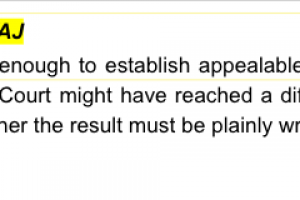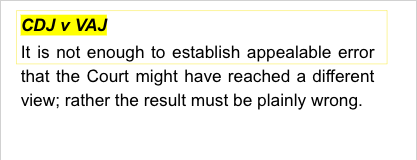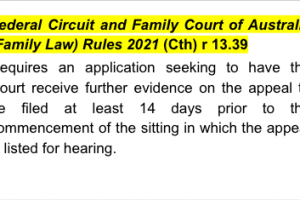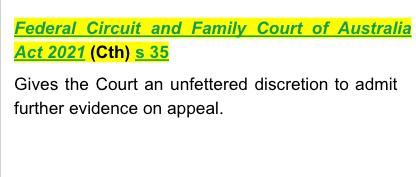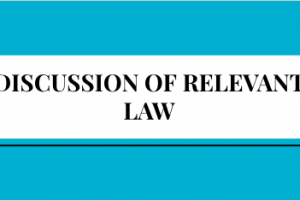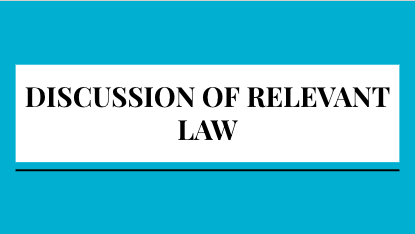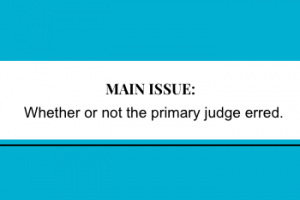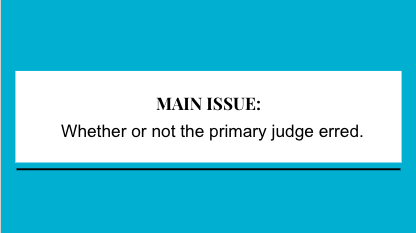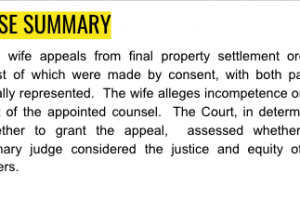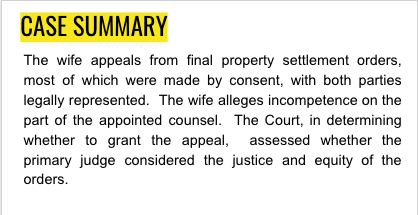- · 4847 friends
Wife Appeals Final Property Settlement Orders

Carson & Colt [2022] FedCFamC1A 106 (14 July 2022)

The wife appeals from final property settlement orders, most of which were made by consent, with both parties legally represented. The wife alleges incompetence on the part of the appointed counsel. The Court, in determining whether to grant the appeal, assessed whether the primary judge considered the justice and equity of the orders.

Facts:
The parties commenced cohabitation in 2001, married in 2004, and separated in February 2019. Two children were born into the relationship, who are presently aged 17 years and 9 years respectively. Parenting and property proceedings were commenced by the wife in April 2019.
Both aspects of the matter were listed for trial before the primary judge on 29 November 2021, and a timetable was ordered for the filing and service of the parties’ trial material. The (then self-represented) wife did not comply with that timetable.
An order was made in respect of the wife under s 102NA of the Family Law Act 1975 (Cth) (“the Act”). A firm of legally aided solicitors appointed to act for the wife filed a Notice of Address for Service on 16 November 2021. Since their appointment occurred so close to trial, they did not confer with the wife until the week before the hearing, which saw the wife’s trial material filed thereafter. Counsel for the wife was only briefed on Thursday 25 November 2021.
When the trial commenced on 29 November 2021, the counsel for the wife was uncomfortable with the position both she, her instructing solicitor, and the wife were in, and advised the primary judge early in the piece that she wanted the property trial adjourned, albeit not the parenting proceedings.
That then resulted in the wife’s counsel seeking to have the matter stood down in order to “have some discussions with my learned friend, in terms of trying to settle the property pool at least. The counsel for the husband handed up to the Court “a property schedule signed by both the parties and a minute of order” in the property proceedings. He advised that there were only two proposed orders that were not agreed upon.
One related to whether the wife should provide the husband with indemnities for any liability he may have arising from his involvement in the parties’ businesses, and the other was whether he should be able to caveat the Suburb A property to preclude the wife from dealing with it prior to him receiving his $1.5 million.
The indemnity issue was shortly thereafter resolved in the husband’s favour. The wife sought to lead further evidence in the appeal, which was in part opposed by the husband.
To the extent that those orders were made by consent, they provide for the wife to pay the husband the sum of $1.5 million within six months, in default of which the wife’s property at Suburb A (“the Suburb A property”) is to be sold, and the $1.5 million paid from the net sale proceeds. Otherwise, each party was to retain the property and superannuation held in their respective names, including for the wife to retain identified business entities and any damages recovered in specified Supreme Court proceedings, or by way of workers compensation. To the extent those orders were not made by consent, they comprise broad indemnities imposed upon the wife in respect of the husband’s involvement in the parties’ businesses during the relationship.

Issue:
Whether or not the primary judge erred.

Applicable law:



Analysis:
The primary judge clearly did – albeit in a short-hand way – consider the justice and equity of the orders she was proposing to make. There is no reason to think that the primary judge was there doing anything other than recording her acceptance that the outcome was just and equitable, so as to found an order under s 79 of the Act.
As counsel for the husband before the Court demonstrated, on one view, the husband was receiving about 35 percent of the net pool of assets. That a different conclusion can be reached factoring in other, disputed matters, does not point to anything other than that commerciality and compromise were likely at play here in the settlement.
The main, and perhaps only, basis for the primary judge ordering the indemnities was that the wife was retaining “various entities and the like” as the husband had argued. The wife was taking such value as the parties’ businesses represented, and the primary judge reasoned that associated potential burdens should go with such benefits.
Given the way in which the parties presented their arguments, that is a sufficient exposure of the reasoning for the ordering of indemnities. Exhibit 2 makes it plain that the debt was agreed at $1.5 million, as does the transcript.
The primary judge was plainly troubled about adjourning the property trial, given the vintage of the proceedings, the fact that the problems identified by the wife’s then counsel were long-standing, and the prospect that if the trial of the parenting and property proceedings did not jointly proceed, the wife may not continue to be in receipt of legal aid funding for the property trial. The transcript demonstrated the wife’s then counsel well understood the chances of the property proceedings adjourning were slight.
Conclusion:
Save that paragraphs, 5–8 (both inclusive) of the wife’s affidavit filed 20 June 2022, and the material exhibited in those paragraphs, is admitted into evidence, otherwise, the wife’s Amended Application in an Appeal filed 5 July 2022 is dismissed. Appeal NAA 105 of 2021 is dismissed. The appellant is to pay the respondent’s costs in the sum of $23,000 within 28 days.


